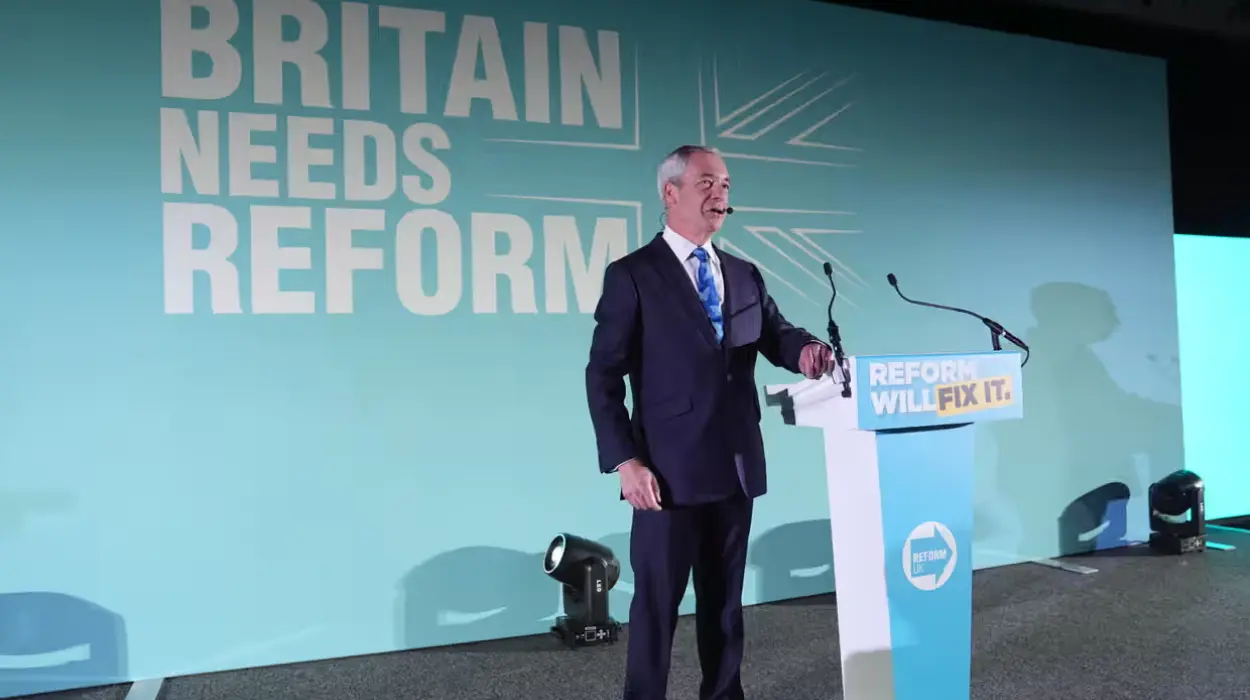UK (Parliament Politics Magazine) – Social Market Foundation study finds Reform UK underperformed in funded areas, hinting that local gains may discourage populist preferences.
As reported by The Guardian, a new study revealed that constituencies benefiting from the previous government’s contentious levelling-up fund saw fewer votes for Reform UK in the general election. It highlighted that swift and visible development projects might limit populist voter support.
What did the SMF data say about Reform UK’s appeal to voters?
The Social Market Foundation’s groundbreaking study examined a wide array of factors influencing Reform UK’s support at the constituency level. Multiple determinants were found that boost the party’s popularity in specific seats. These findings shed light on what drives the party’s appeal.
Similar to other populism studies, the research reveals a correlation between a lower percentage of local voters with degrees and stronger support for Reform UK.
Nigel Farage’s party performed well in areas with a significant white population, including those where this demographic was shrinking due to immigration. Increased crime rates were also linked to increased backing for Farage’s party.
The study revealed that an older demographic did not appear to increase the chances of Reform UK’s success. It indicated that constituencies receiving levelling-up funds had lower-than-expected votes for the party based on their demographics.
The study highlighted the role local political environments played in determining Reform UK’s success.
The seat-by-seat breakdown revealed that the party struggled in Liverpool and the south-west of England, possibly due to the longstanding influence of the Liberal Democrats.
The study showed that although declining economic growth is typically associated with support for populism, the relationship is more intricate.
What did Jamie Gollings say about levelling up funding and Reform UK?
According to Jamie Gollings, the research director at the SMF, there were important caveats to consider when distinguishing correlation from causation. He stated that levelling up funds likely went to
“places that were more inclined towards the mainstream parties for other reasons – they weren’t necessarily giving money to places which were always going to be Reform.”
He stated that there might still be important lessons for Keir Starmer’s government, adding,
“This could be interesting for Labour. With their big infrastructure projects and planning reforms, these are things that might only pay off in decades.”
Mr Gollings said,
“If they want to get credit in the more immediate term, they might need to try other mechanisms, whether making sure some of the construction jobs go to local people, or just making the area feel better, whether helping the local high street or sorting out potholes.”
He highlighted Clacton, Essex, a seat won by Farage, showing a rapid growth in skilled green economy jobs, but these opportunities may not directly benefit many locals.
The SMF research director said,
“Labour is really focusing on growth, and on the dashboards in the Treasury, they might see new jobs or factories or investment coming here and there. And so things might look great from Whitehall, but the question is, what are people actually experiencing on the ground?”
Mr Gollings continued,
“In some cases, it may correspond, and income data may be a reliable prediction of how people feel about their economic circumstances. But it can be slightly more indirect.”
He explained that the constituency-level analysis, which gathered over 70 data points across multiple sectors, showed that simply having a large white population wasn’t the sole factor influencing Reform support.
The director stated,
“Although we can see from polling that white people are more likely to vote for Reform, it doesn’t really say anything about what’s happening in the area.”
Mr Gollings added,
“Whereas this kind of seat-level analysis shows that if there are people in places where there has been a moderate fall in the proportion of white people, they are more likely to vote for Reform.”
Why did Reform UK outperform in some seats?
The success of Reform UK in certain constituencies could be attributed to specific factors, including the impact of prominent candidates like Nigel Farage and former Conservative MP Lee Anderson.
Reform UK struggled in several areas where the Tory Party presented candidates with a strong record on essential issues like Brexit.
What did Labour Together’s report reveal about regional economic inequality?
A report from the thinktank Labour Together shows that governments have consistently spent more on economic growth in the south-east, particularly under Boris Johnson, creating a regional imbalance.
A government spending analysis shows that in the past 16 years, ministers allocated nearly 15% more funding to housing, education, and infrastructure projects in the south-east than in other areas. The gap peaked between 2019 and 2024, averaging 19%.
The report by Labour Together estimated that the south-east saw £100bn more in growth spending from 2008 to 2024.


